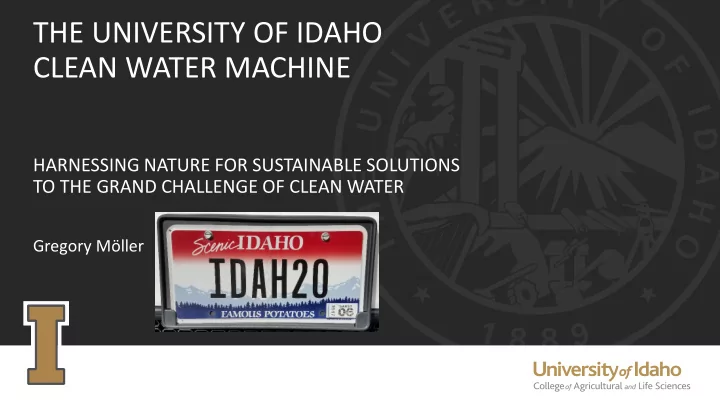

THE UNIVERSITY OF IDAHO CLEAN WATER MACHINE HARNESSING NATURE FOR SUSTAINABLE SOLUTIONS TO THE GRAND CHALLENGE OF CLEAN WATER Gregory Möller
Harnessing Nature for Clean Water: The alchemy of WASREC Water – Air – Sand – Rust – Electricity - Charcoal
Phosphorus discharged from out-of-date sewage treatment plants, intensive livestock production and lost via agricultural erosion and runoff Contribute to a global epidemic of eutrophication in freshwater, estuarine and near shore ocean environments Florida Algae Global Phosphorus Research Initiative
Loss of potable water resources, aquatic biodiversity and formation of large “dead zones.” Arabian Sea Global Phosphorus Research Initiative
Third Generation Reactive Filtration Clean Water Machine - Mobile Research
Reactive Filtration (RF) Physical filtration combined with reactive chemistry (or microbiology) to modify water contaminants, including pathogens, and remove or destroy them from water .
Wastewater + Fe 3+ Reactive Filtration Reject recycling Allows Upflow Fe:P ratio 2:1 Continuous Backwash Moving Bed Sand Filter
RF-Sacrificial Scanning Electron Micrographs Adsorptive Catalyst Hydrous Ferric Oxide (HFO) Coated Sand Fe 3+ Blue PRO/Green PRO Fe 3+/2+ + Ozone Blue CAT/Green CAT Biochar N-E-W Tech Aragonite (CaCO 3 ) Maximus
RF-Adsorption by HFO Fe P Sand surface with HFO-coating Contaminants coordinate w/ HFO
UI Reactive Filtration (RF) • Modeled on nature: Whole System Architecture • Six issued and licensed patents • Four patents pending • 2009 WEF/WERF Harrison Prescott Eddy Research Medal • “25 Innovations That Changed the World” (AUTM) • Several billion gallons of water treated per year • Several million people with a softer footprint on the planet
Citronelle, Alabama Currently the lowest TP discharge permit in the US: at 0.022 mg/L Commissioned in March ‘16 at <0.010 mg/L US NPDES report mean 2017 at 0.011 mg/L
USEPA ECHO Database Discharge Permit 2017 Average 0.022 mg/L 0.011 mg/L
Citronelle, AL USA WWTF 99.7% TP Removal from 3.5 to 0.011 mg/L Oligotrophic Nutrient Level
Clean Water Machine Catalytic Oxidation Fe 2+/3+ + Ozone 2. Homogeneous-Heterogeneous catalysis 3. HFO as a sacrificial d -orbital catalyst 4. Reactive filter as a massive, continuously regenerated, catalyst bed Yields: Hydroxyl radicals, ferryl/ferrate ions, peroxides, ozone, oxygen, free radicals…
Iron Catalysis: What US$100 Buys You Rh (0.5 g) Treitler, 2010 . Pd (6.4 g) . Pt (2.0 g) . Au (2.6 g) Ni (5,300 g) Cu (15,000 g) Fe (500,000 g)
RF Catalytic Oxidation Results Secondary RF CATOX Recycled Reject Effluent Product Effluent Effluent [5%]
Catalytic Oxidation: CEC Destructive Removal Compounds of Emerging Concern, Micropollutants, Priority Substances ng/L
Catalytic Oxidation: Sterilization E. coli
1800 m 3 /day trial of Fe 2+ plus ozone catalytic oxidation in a moving bed sand filter: Blue CAT/Green CAT process. 2016-17 UKWIR CIP2 $178M country-wide technology trials address Priority Substance and Total Phosphorus removals.
Biochar BioCarbon
Nutrient-Energy-Water N-E-W Tech™ “Biochar Water Treatment” N/P Recovery Carbon Negative Water Treatment Soil Amendment System
N-E-W Tech™ Biochar Reactor
N-E-W Tech™ Enhanced Efficiency Fertilizer N-E-W Terra™/Moo Terra™ 1. Nutrient-Upcycled Biocarbon Fertilizer 2. N-E-W Terra™ Municipal WWTP 3. Phosphorus: 1.7% w/w (13X upcycle) 4. Nitrogen: 0.8% w/w (3X upcycle) Preliminary greenhouse data shows the nutrient upcycled biochar has a positive growth effect.
N-E-W Tech Net Total per 1000 gallons (3785 liters) Global Warming Potential (GWP) GWP mass CO 2 System Input/Output equivalent WATER SYSTEM BOUNDARY TOTAL 3.32 kg Nutrient Upcycled Biochar Soil Amendment -11.8 kg WATER SYSTEM + SOIL BOUNDARY TOTAL -8.02 kg Carbon Negative Advanced Water Treatment Process
Water – Air – Sand – Rust – Electricity - Charcoal Energy-Water Sankey Diagram The challenge of sustainability …with economic sustainability
Planktonic Biogenic Aragonite CaCO 3 Carbon “Neutral” Calcium Source Maximus
Clean Water Machine Team
Recommend
More recommend